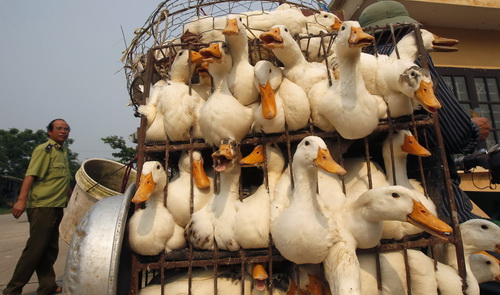Vietnam’s livestock and poultry industry will be the biggest losers when the Trans-Pacific Partnership (TPP) comes into effect and the ASEAN Economic Community (AEC) is formed, according to recent research by the Vietnam Institute for Economic and Policy Research (VEPR) under the University of Economics and Business.
Comparatively advantageous industries are expected to benefit the most, while disadvantageous industries, like livestock and poultry, may suffer, albeit to different degrees, according to the “Analyzing the Impacts of TPP and AEC on Vietnam’s Macro-Economy and Livestock Sector” report released on the VEPR website last Thursday.
The TPP is a proposed regional free trade agreement aimed at eliminating tariffs and lowering non-tariff barriers that is being negotiated by 12 countries throughout the Asia-Pacific, including Australia, Brunei, Canada, Chile, Japan, Malaysia, Mexico, New Zealand, Peru, Singapore, the U.S. and Vietnam.
As planned, the Association of Southeast Asian Nations (ASEAN), which includes such countries as Indonesia, Malaysia, the Philippines, Singapore, Thailand, Brunei, Cambodia, Laos, Myanmar and Vietnam, will form the AEC, a free trade bloc, by the end of this year.
The livestock and poultry sector, the second-largest of Vietnam's agriculture after crop cultivation, is considered unsustainable, uncompetitive and vulnerable to free trade pacts, said the report, funded by the Japan International Cooperation Agency.
The livestock industry has low competiveness, having mostly small-scale farming and production, heavy dependence on imported breeds and feeds, common disease problems, limited slaughtering hygiene and food safety and environmental pollution, according to the research.
These issues permeate all livestock sub-sectors, such as swine, poultry, cattle, and milk.
The consequences are low productivity and production output, and the increasing need for imports from TPP countries, especially the U.S., Australia, New Zealand, Canada and AEC countries such as Thailand.
Domestic livestock production will face further and fiercer competition when Vietnam integrates deeper into the regional and global economies, and specifically when the TPP comes into effect in 2016.
The report also revealed that in both free trade blocs, output will decline in almost all livestock industries, except for other animal products, mainly live swine and poultry.
Moreover, the declining output will also lead to a drop in demand for both skilled and unskilled workers in the livestock sector.
Given the low productivity and competitiveness of the industry, poultry and swine meat producers will suffer the most in terms of output and welfare, according to the research.
However, the current consumption habits of Vietnamese people, most of whom prefer fresh/warm meat over frozen one, may slow down the impacts, while milk and beef producers have a better chance of survival.
Considering the overall livestock sector, consumers and importers will have access to cheaper products, while producers and exporters will be heavily affected as they will not be able to compete with the influx of imports from other countries, such as bovine from Australia and poultry and swine meat from the U.S.
Along with this, the loss of import tariff revenue will cause the welfare of the livestock sector to decline after the TPP comes into effect.
In the short term, as consumer habits cannot change quickly, the impacts of trade liberalization on domestic producers will not be as severe.
However, in the mid and long term, as frozen meat will become more widely accepted, domestic production will face more difficulties in competing with meat products from TPP countries.
As a result, the sector needs to undertake quick restructuring efforts to improve efficiency in facing foreign competitors, the report suggested.
|
Still a big beneficiary For the economy as a whole, in almost all simulation scenarios, Vietnam is shown to be the TPP member achieving the largest GDP change in percentage terms, said the report. However, the economic impact of the AEC is insignificant compared to that of the TPP. When analyzing GDP changes, it is observed that the increase in GDP thanks to trade liberalization comes primarily from rises in consumption and investment, surpassing the surge in imports after tariff cuts. Moreover, Vietnam also gains the most in economic welfare in percentage change. Regarding investment, the gain for Vietnam is the highest among TPP member countries, approximate to Japan and almost double that of Australia, Malaysia and the U.S., following the scenarios without spillover effects of trade facilitation to non-TPP economies. In examining the scenarios which assess the TPP’s impact, results show that Vietnam’s trade with other TPP countries will increase in all cases. Meanwhile, Vietnam will increase imports and slightly decrease exports to non-TPP economies. Exports of textiles, apparel, leather and footwear from Vietnam to the U.S. will surge impressively, while Vietnam’s total shipments will slightly go down, according to the research. |
Like us on Facebook or follow us on Twitter to get the latest news about Vietnam!


















































